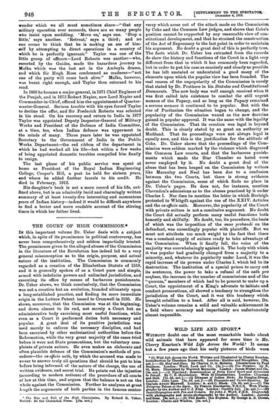THE COURT OF HIGH COMMISSION.* IN this important volume Dr.
Usher deals with a subject which, in spite of its prominence in political controversy, has never been comprehensively and seldom impartially treated. The prominence given to the alleged abuses of the Commission in the literature of the Revolution has indeed led to a very general misconception as to the origin, purpose, and actual nature of the institution. The Commission is commonly regarded as a creation of the Elizabethan Statute of 1559, and it is generally spoken of as a Court pure and simple, armed with indefinite powers and unlimited jurisdiction, and executing its office by means of barbarous punishments. Dr. Usher shows, we think conclusively, that the Commission was not a creation but an evolution, founded ultimately upon a long-established practice, and finding its more immediate origin in the Letters Patent issued to Cromwell in 1535. He shows, moreover, that the Commission was at the beginning, and down almost to its end, not merely a Court but an administrative body exercising most useful functions, while even as a Court it performed duties both necessary and popular. A great deal of its punitive jurisdiction was used merely to enforce the necessary discipline, and had been exercised by other ecclesiastical authorities before the Reformation, while the very great majority of the cases tried before it were not State prosecutions, but the voluntary com- plaints of private suitors. He even makes an elaborate and often plausible defence of the Commission's methods of pro- cedure—the ex-officio oath, by which the accused was made to swear to answer truly all questions that should be put to him before being informed of the nature of the charge, the use of written evidence, and secret trial. He points out the injustice (according to modern notions) of the procedure of all courts of law at this time, and argues that the balance is not on the whole against the Commission. Further he analyses at great length the arguments of both parties in the famous oontro-
• The Rite and Fail of the ugh Commission. By Roland G. Usher. Oxford: At the Clarendon Press. [15s. net.]
versy which arose out of the attack made on the Commission by Coke and the Common Law judges, and shows that Coke's position cannot be supported by any reasonable view of con- stitutional development, and that he strained the construction of the Act of Supremacy to the last point in order to maintain his argument. No doubt a great deal of this is perfectly true. The facts which Dr. Usher has extracted from the records do show the history and functions of the Court in a light very different from that in which it has commonly been regarded, but in order to put his case as concisely and clearly as possible he has left unstated or understated a good many of the. elements upon which the popular view has been founded. The real reason of the unpopularity of the Commission is surely that stated by Dr. Prothero in his Statutes and Constitutional Documents. The new body was well enough received when it was first called into existence to combat the still urgent menace of the Papacy, and so long as the Papacy remained a serious menace it continued to be popular. But with the rise of Puritanism the situation began to change, and the popularity of the Commission waned as the new doctrine gained in popular approval. It was the same with the legality of the Commission. That its creation was legal is beyond doubt. This is clearly stated by so great an authority as Maitland. That its proceedings were not always legal is equally sure, and this is the justification for the attitude of Coke. Dr. Usher shows that the proceedings of the Com- mission were seldom marked by the violence which disgraced the Common Law courts, and that the barbarous punish- ments which made the Star Chamber so hated were never employed by it. No doubt a great deal of the abuse that has been heaped on the Commission by writers like Macaulay and Neal has been due to a confusion between the two Courts, but there is strong evidence against the Commission, some of which finds no place in Dr. Usher's pages. He does not, for instance, mention Clarendon's admissions as to the abuses practised by it under Charles I. Nor does be mention the letter in which Burleigh protested to Whitgift against the use of the XXIV. Articles and the ex-officio oath. Moreover, the popularity of the Court with private suitors is not a conclusive argument. No doubt the Court did actually perform many useful functions both honestly and skilfully. No doubt, too, its procedure, the basis of which was the imposition of the onus probandi on the defendant, was exceedingly popular with plaintiffs. But we must not attribute too much weight to the fact that there was a constant supply of suitors ready to take advantage of the Commission. When it finally fell, the voice of the majority was overwhelmingly against it. The body with which it was popular had gradually changed from a majority to a minority, and, whatever its popularity under Laud, it was the rapid increase of its powers under Charles I. which led to its destruction. The institution of a special prison to carry out its sentences, the power to take a refusal of the oath pro confesso, the increase in the number of commissions and of the "quorum," members of which had to be present to make up a Court, the appointment of a King's advocate to initiate and conduct prosecutions, all showed a tendency to strengthen the jurisdiction of the Court, and it was this tendency which brought rebellion to a head. After all is said, however, Dr. Usher's volume remains a solid and valuable achievement in a field where accuracy and impartiality are unfortunately almost impossible.


































































 Previous page
Previous page